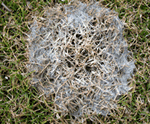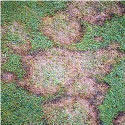There are two types of snow mold – grey and pink.
- Has tiny black mycelia masses on the blades.
- Rarely damages more than the blade of the grass and recovers quickly.
- Usually only occurs after prolonged snow cover.
- May look like white cobwebs initially, then matures to a faint pink color.
- May invade the crowns and roots of the grass.
- Can occur in cool, wet conditions even in the absence of snow.
Snow mold can be a sign of one or more of the following:
- A lot of snow cover over the winter.
- The lawn wasn’t mowed short enough in the fall.
- The soil is wet and holding moisture.
- The soil is lacking nutrients needed to combat the fungi.
Snow mold can be minimized by:
- Avoid excessive nitrogen in the late fall.
- Mow the lawn late into the season, so it doesn’t lay over itself.
- Clean up leaves in the fall.
- Manage thatch to avoid having more than 2′ (less than 1/2″ is ideal).
Sterling Is The Solution (@07) 767-5555








